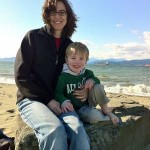Instructor 1, UBC
BA (Univ. of Idaho), MA (Univ. of Texas), PhD (Univ. of Texas)
Email: c.hendricks@ubc.ca
I started teaching in the department of Philosophy at UBC in 2004, and am thrilled to be able to participate in the Arts One program. This program seems to be a great forum for doing the kind of intensive, interactive, and interdisplinary work that I feel is important for genuine critical inquiry and an engaged, active education.
Before coming to UBC I taught for four years at the University of Wisconsin-Rock County, a two-year transfer campus of the University of Wisconsin system – students would start their studies there, and move on to finish them at one of the larger universities. I found the small class sizes and the liberal arts focus on that campus to be a great atmosphere for students beginning their college careers, as it offered ample opportunity for discussion, for honing writing skills, and for integrating disciplines through close contact between professors and students in different departments. I believe the Arts One program offers Arts students at UBC a similar opportunity for starting their university studies off well, and I feel fortunate to be able to participate.
I earned my PhD in Philosophy from the University of Texas at Austin in 2000, focusing my graduate studies on the work of feminist and Continental philosophers such as Julia Kristeva, Luce Irigaray, Friedrich Nietzsche, and Michel Foucault. While in Texas, Wisconsin, and here at UBC I have taught courses such as: Introduction to Philosophy, Feminist Philosophy, Moral Philosophy, Social and Political Philosophy, Aesthetics (Philosophy of Art) and Introductory Logic.
My research lately has been on the political role of philosophers and philosophy — what philosophers as intellectuals, and the study and practice of philosophy, can contribute to discussions about, and resolutions of, social and political questions/problems. Within this broad topic I consider issues such as relationships between theory and practice, questions of authority and autonomy (in traditional educational settings and in the public realm), and what it means to engage in “critical thinking.” I am particularly interested in delving more deeply into the philosophy of education in the coming years.
In addition, I try to spend as much time as I can enjoying the natural beauty of the fantastic landscape in and around Vancouver!



